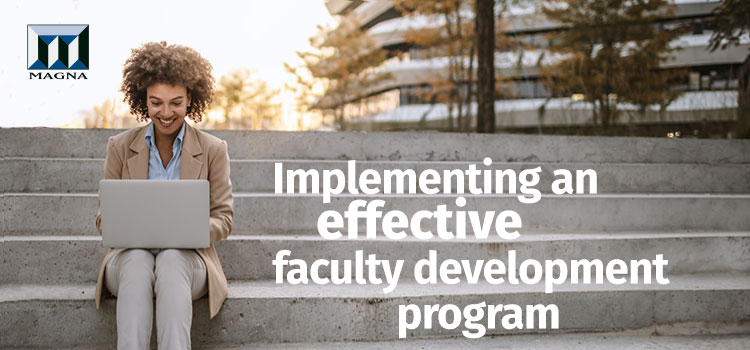This post is sponsored by Faculty Commons
Professional development keeps professors and other faculty members up to date with industry and technology trends; it reduces turnover and increases staff engagement. Educators who participate in a faculty development program improve their teaching skills and become more effective instructors.
According to the American Society for Training and Development, organizations that invest in ongoing professional development see a 24% higher profit margin — with that rise credited to greater employee retention.
Professional development is not remedial; it should be an integral component of faculty members’ efforts to become more effective educators.
Donna Qualters, retired director of the Center of Learning and Teaching and faculty developer at Tufts University says, “The bottom line to have an efficient and effective faculty development program is to have a multi-pronged approach aligned to the stages of change so that you’re sure that you’re able to engage all faculty at some point over time.”
On-going PD is critical to an institution’s health
All educators can benefit from a faculty development program, yet many colleges and universities don’t fully understand the profound impact of effective and consistent programs and how the investment will help their institution’s future success.
The best faculty development programs are those with core features that have a positive and significant effect on teachers’ increases in skills and knowledge, combined with those that provide opportunities for active learning. These components yield results that translate into better educators, and subsequently, better student outcomes.
Qualters points out, “Faculty development is about change. And we often say that, well, faculty resists change. People always resist change. The truth is, people don’t resist change. They resist the loss that the change creates.”
Simultaneously, activities central to the success of teachers will attract better talent. When the word gets out that faculty feels valued, an institution will attract and retain talented faculty members.
It is also important that professional development programs be available at faculty’s fingertips. The best programs offer development that is accessible everywhere – online, in cloud-based platforms.
Factors that foster successful faculty engagement
When adopting a faculty development program, look to inspire your teaching faculty with programs that are content-rich, thought-provoking and designed to promote lively discussions that will create actionable results.
An effective and efficient program must have the framework that supports faculty as they go through the different stages of change: contemplative, preparation, action, and maintenance. This multi-pronged approach is what boosts engagement, leading to greater understanding for faculty as well as improved results from the professional development program. It’s also valuable to have faculty reflect upon, and give feedback on, their professional development as they go.
“The key to changing faculty and to raising their assumptions is reflection, reflection, reflection,” explains Qualters.
Remember that professional development is an ongoing need — a long-term and continuous effort. A carefully designed faculty development program that is appropriate for those teaching in the face-to-face, blended, or online classroom can facilitate and create a culture that supports a focus on supporting the teachers, that spills over into the student success.
If you are seeking a comprehensive educational development resource for all faculty and are ready to learn more, download the Faculty Development Special Report from Magna Publications.
